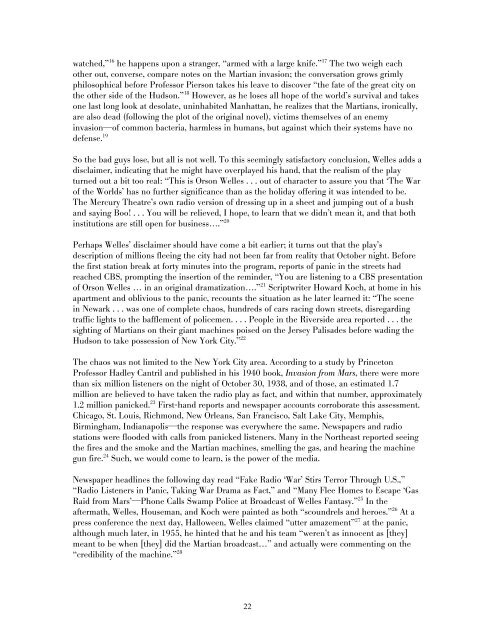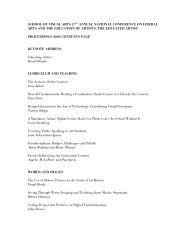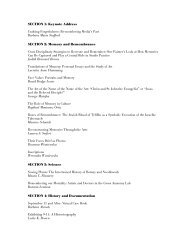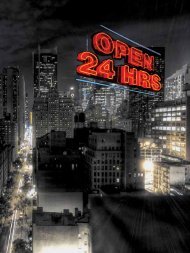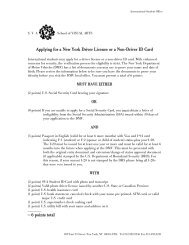the aesthetic equivalent - Directory Listing Not Here - School of ...
the aesthetic equivalent - Directory Listing Not Here - School of ...
the aesthetic equivalent - Directory Listing Not Here - School of ...
You also want an ePaper? Increase the reach of your titles
YUMPU automatically turns print PDFs into web optimized ePapers that Google loves.
watched,” 16 he happens upon a stranger, “armed with a large knife.” 17 The two weigh each<br />
o<strong>the</strong>r out, converse, compare notes on <strong>the</strong> Martian invasion; <strong>the</strong> conversation grows grimly<br />
philosophical before Pr<strong>of</strong>essor Pierson takes his leave to discover “<strong>the</strong> fate <strong>of</strong> <strong>the</strong> great city on<br />
<strong>the</strong> o<strong>the</strong>r side <strong>of</strong> <strong>the</strong> Hudson.” 18 However, as he loses all hope <strong>of</strong> <strong>the</strong> world’s survival and takes<br />
one last long look at desolate, uninhabited Manhattan, he realizes that <strong>the</strong> Martians, ironically,<br />
are also dead (following <strong>the</strong> plot <strong>of</strong> <strong>the</strong> original novel), victims <strong>the</strong>mselves <strong>of</strong> an enemy<br />
invasion—<strong>of</strong> common bacteria, harmless in humans, but against which <strong>the</strong>ir systems have no<br />
defense. 19<br />
So <strong>the</strong> bad guys lose, but all is not well. To this seemingly satisfactory conclusion, Welles adds a<br />
disclaimer, indicating that he might have overplayed his hand, that <strong>the</strong> realism <strong>of</strong> <strong>the</strong> play<br />
turned out a bit too real: “This is Orson Welles . . . out <strong>of</strong> character to assure you that ‘The War<br />
<strong>of</strong> <strong>the</strong> Worlds’ has no fur<strong>the</strong>r significance than as <strong>the</strong> holiday <strong>of</strong>fering it was intended to be.<br />
The Mercury Theatre’s own radio version <strong>of</strong> dressing up in a sheet and jumping out <strong>of</strong> a bush<br />
and saying Boo! . . . You will be relieved, I hope, to learn that we didn’t mean it, and that both<br />
institutions are still open for business….” 20<br />
Perhaps Welles’ disclaimer should have come a bit earlier; it turns out that <strong>the</strong> play’s<br />
description <strong>of</strong> millions fleeing <strong>the</strong> city had not been far from reality that October night. Before<br />
<strong>the</strong> first station break at forty minutes into <strong>the</strong> program, reports <strong>of</strong> panic in <strong>the</strong> streets had<br />
reached CBS, prompting <strong>the</strong> insertion <strong>of</strong> <strong>the</strong> reminder, “You are listening to a CBS presentation<br />
<strong>of</strong> Orson Welles … in an original dramatization….” 21 Scriptwriter Howard Koch, at home in his<br />
apartment and oblivious to <strong>the</strong> panic, recounts <strong>the</strong> situation as he later learned it: “The scene<br />
in Newark . . . was one <strong>of</strong> complete chaos, hundreds <strong>of</strong> cars racing down streets, disregarding<br />
traffic lights to <strong>the</strong> bafflement <strong>of</strong> policemen. . . . People in <strong>the</strong> Riverside area reported . . . <strong>the</strong><br />
sighting <strong>of</strong> Martians on <strong>the</strong>ir giant machines poised on <strong>the</strong> Jersey Palisades before wading <strong>the</strong><br />
Hudson to take possession <strong>of</strong> New York City.” 22<br />
The chaos was not limited to <strong>the</strong> New York City area. According to a study by Princeton<br />
Pr<strong>of</strong>essor Hadley Cantril and published in his 1940 book, Invasion from Mars, <strong>the</strong>re were more<br />
than six million listeners on <strong>the</strong> night <strong>of</strong> October 30, 1938, and <strong>of</strong> those, an estimated 1.7<br />
million are believed to have taken <strong>the</strong> radio play as fact, and within that number, approximately<br />
1.2 million panicked. 23 First-hand reports and newspaper accounts corroborate this assessment.<br />
Chicago, St. Louis, Richmond, New Orleans, San Francisco, Salt Lake City, Memphis,<br />
Birmingham, Indianapolis—<strong>the</strong> response was everywhere <strong>the</strong> same. Newspapers and radio<br />
stations were flooded with calls from panicked listeners. Many in <strong>the</strong> Nor<strong>the</strong>ast reported seeing<br />
<strong>the</strong> fires and <strong>the</strong> smoke and <strong>the</strong> Martian machines, smelling <strong>the</strong> gas, and hearing <strong>the</strong> machine<br />
gun fire. 24 Such, we would come to learn, is <strong>the</strong> power <strong>of</strong> <strong>the</strong> media.<br />
Newspaper headlines <strong>the</strong> following day read “Fake Radio ‘War’ Stirs Terror Through U.S.,”<br />
“Radio Listeners in Panic, Taking War Drama as Fact,” and “Many Flee Homes to Escape ‘Gas<br />
Raid from Mars’—Phone Calls Swamp Police at Broadcast <strong>of</strong> Welles Fantasy.” 25 In <strong>the</strong><br />
aftermath, Welles, Houseman, and Koch were painted as both “scoundrels and heroes.” 26 At a<br />
press conference <strong>the</strong> next day, Halloween, Welles claimed “utter amazement” 27 at <strong>the</strong> panic,<br />
although much later, in 1955, he hinted that he and his team “weren’t as innocent as [<strong>the</strong>y]<br />
meant to be when [<strong>the</strong>y] did <strong>the</strong> Martian broadcast…” and actually were commenting on <strong>the</strong><br />
“credibility <strong>of</strong> <strong>the</strong> machine.” 28<br />
22


